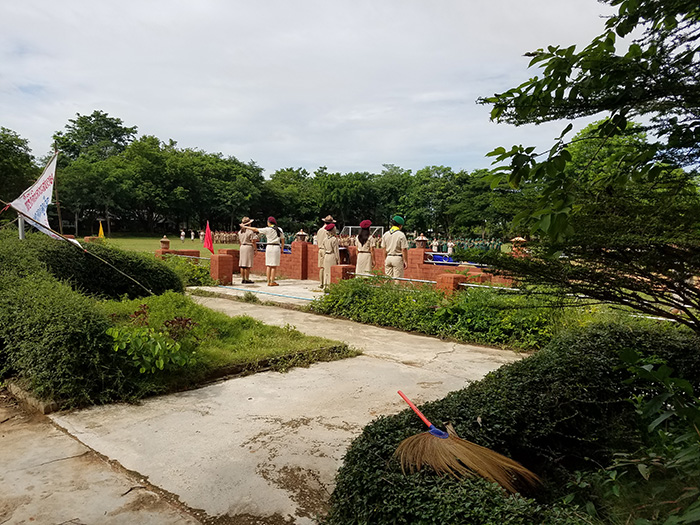Students conduct research in Asia with travel grants
By Kathy Hovis

Six students are researching fencing, teaching English, exploring how regions recover from natural disasters, and immersing themselves in Asian languages, thanks to grants from the Department of Asian Studies in the College of Arts and Sciences.
The summer study, research and service travel grants help students pay for travel and living expenses. At the end of the summer, students complete a paper summarizing their language and cultural experiences.
Michael Mauer ’18, an Asian studies and computer science major, is spending the summer in Japan, researching Japanese fencing clubs as a part of his senior thesis. “This is my third time in Japan, but my first in Tokyo,” he said. “This city is huge and really hectic. There are people and information and lights and sounds everywhere. It’s fun, but also a little exhausting.”
Mauer spent a week at Jichi Medical University in an exchange program, then spent two weeks in Kamakura living in Zen temples as a part of class on Zen Buddhism taught by Jane Marie Law, associate professor of religious studies. He is continuing his research by visiting fencing clubs, observing and participating in practices and interviewing club members.
“It’s amazing to connect to people from a different culture via our shared love of a sport,” Mauer said. “As athletes and students, we already have a lot in common.”
Paola Camacho-Lemus ’18, a religious studies and Asian studies major and a Mellon-Mays undergraduate fellow, is interested in how people heal from large-scale traumatic events. She’s in Japan to talk to people affected by the 2011 tsunami that caused the Fukushima Dai-ichi nuclear power plant meltdown.
“So far, I have visited some of the most affected towns on the coastline of the northeast of Japan that are currently rebuilding and recovering,” she said. “One of the most challenging things about my research thus far is how sensitive the subject matter I’m exploring is. I have met many incredible people and heard so many inspiring and unique stories about the events following the disasters.”

Her goal is to document how Japanese religious institutions are helping to ameliorate the effects of these disasters.
Emma Berger ’19, a policy analysis management major, is in Beijing, taking part in an intensive Mandarin language program.
“I can see an improvement in my language skills every day,” Berger said, adding that the course includes four hours of Chinese classes each day, a one-hour session of individual lessons, then homework and studying. “We even had to sign a language pledge which states that throughout our trip we can only speak in Chinese, except when speaking with family on the phone.”
Anuhea DeLude ’18, a biology major, is visiting Thailand for the first time, though she’s studied the language for two years. She’s helping English teachers at a town near the Cambodian border and living in a school dormitory.
“So far I haven’t used Thai as much as I could due to a mixture of people wanting to practice English and my own nervousness around native speakers,” DeLude said. “But people are extremely nice and accommodating.”
These summer study trips sometimes help students to solidify their plans for careers or grad school.
“I’ve been seriously considering a career in teaching – doing Teach for America after graduation for example – so this experience has given me a taste of what that could be like,” DeLude said. “It has also shown me how much more Thai I still need to learn to be fluent.”
Berger said the trip has helped solidify her interest in international studies. Camacho-Lemus said his research interest will continue into graduate school.
“This trip has made clear to me that my career must involve some moral and ethical component, somehow related to the things I am good at,” said Sasha Chanko ’19, a math major in Law’s Zen Buddhism class. “This was my second time in Japan, but my first after having begun studying Japanese. This time has felt different in that I understand a lot more about the language and culture and feel less lost in such a foreign place.”
For Mauer, the trip has done the opposite.
“It has really broadened my perspective on the things I can do after graduation. For example, it has made me think more about grad school instead of just getting a job,” he said. “Broadened perspective is good, but I’m less sure what to choose now.”
Funding for the grants comes in part from alumni gifts and the Yasuko Nakanishi-Whitman Memorial Fund for Japanese Language Studies and the Irene M. Anderson summer travel scholarship fund.
Kathy Hovis is a writer for the College of Arts and Sciences.
Media Contact
Get Cornell news delivered right to your inbox.
Subscribe